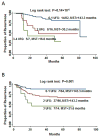Identification of polymorphisms in ultraconserved elements associated with clinical outcomes in locally advanced colorectal adenocarcinoma
- PMID: 22673945
- PMCID: PMC3465518
- DOI: 10.1002/cncr.27653
Identification of polymorphisms in ultraconserved elements associated with clinical outcomes in locally advanced colorectal adenocarcinoma
Abstract
Background: Ultraconserved elements (UCEs) are noncoding genomic sequences that completely identical among human, mouse, and rat species and harbor critical biologic functions. The authors hypothesized that single nucleotide polymorphisms (SNPs) within UCEs are associated with clinical outcomes in patients with colorectal cancer (CRC).
Methods: Forty-eight SNPs within UCEs were genotyped in 662 patients with stage I through III CRC. The associations between genotypes and recurrence and survival were analyzed in patients with stage II or III CRC who received fluoropyrimidine-based adjuvant chemotherapy using a training and validation design. The training set included 115 patients with stage II disease and 170 patients with stage III disease, and the validation set included 88 patients with stage II disease and 112 patients with stage III disease.
Results: Eight SNPs were associated with clinical outcomes stratified by disease stage. In particular, for patients with stage II CRC who had at least 1 variant allele of reference SNP sequence 7849 (rs7849), a consistent association with increased recurrence risk was observed in the training set (hazard ratio [HR], 2.39; 95% confidence interval [CI], 1.04-5.52), in the replication set (HR, 3.70; 95% CI, 1.42-9.64), and in a meta-analysis (HR, 2.89; 95% CI, 1.54-5.41). Several other SNPs were significant in the training set but not in the validation set. These included rs2421099, rs16983007, and rs10211390 for recurrence and rs6590611 for survival in patients with stage II disease; and SNPs rs6124509 and rs11195893 for recurrence in patients with stage III disease. In addition, a significant cumulative effect was observed of multiple risk genotypes and potential gene-gene interactions on recurrence risk.
Conclusions: To the authors' knowledge, this is the first study to evaluate the association between SNPs within UCEs and clinical outcome in patients with CRC. The results suggested that SNPs within UCEs may be valuable prognostic biomarkers for patients with locally advanced CRC who receive 5-fluorouracil-based chemotherapy.
Copyright © 2012 American Cancer Society.
Figures


Similar articles
-
Polymorphisms in microRNA genes as predictors of clinical outcomes in colorectal cancer patients.Carcinogenesis. 2015 Jan;36(1):82-6. doi: 10.1093/carcin/bgu224. Epub 2014 Nov 3. Carcinogenesis. 2015. PMID: 25368035
-
Genetic polymorphisms in MicroRNA-related genes as predictors of clinical outcomes in colorectal adenocarcinoma patients.Clin Cancer Res. 2012 Jul 15;18(14):3982-91. doi: 10.1158/1078-0432.CCR-11-2951. Epub 2012 Jun 1. Clin Cancer Res. 2012. PMID: 22661538 Free PMC article.
-
Genetic variants within ultraconserved elements and susceptibility to right- and left-sided colorectal adenocarcinoma.Carcinogenesis. 2012 Apr;33(4):841-7. doi: 10.1093/carcin/bgs096. Epub 2012 Feb 8. Carcinogenesis. 2012. PMID: 22318908 Free PMC article.
-
Functional polymorphisms of circadian positive feedback regulation genes and clinical outcome of Chinese patients with resected colorectal cancer.Cancer. 2012 Feb 15;118(4):937-46. doi: 10.1002/cncr.26348. Epub 2011 Jul 19. Cancer. 2012. PMID: 21773969
-
Protein prognostic biomarkers in stage II colorectal cancer: implications for post-operative management.BJC Rep. 2024 Feb 13;2(1):13. doi: 10.1038/s44276-024-00043-z. BJC Rep. 2024. PMID: 39516345 Free PMC article. Review.
Cited by
-
Highly constrained intergenic Drosophila ultraconserved elements are candidate ncRNAs.Genome Biol Evol. 2015 Jan 23;7(3):689-98. doi: 10.1093/gbe/evv011. Genome Biol Evol. 2015. PMID: 25618141 Free PMC article.
-
Genetic Variations of Ultraconserved Elements in the Human Genome.OMICS. 2019 Nov;23(11):549-559. doi: 10.1089/omi.2019.0156. OMICS. 2019. PMID: 31689173 Free PMC article.
-
Dynamic epigenetic control of highly conserved noncoding elements.PLoS One. 2014 Oct 7;9(10):e109326. doi: 10.1371/journal.pone.0109326. eCollection 2014. PLoS One. 2014. PMID: 25289637 Free PMC article.
-
CD93 gene polymorphism is associated with disseminated colorectal cancer.Int J Colorectal Dis. 2015 Jul;30(7):883-90. doi: 10.1007/s00384-015-2247-1. Epub 2015 May 26. Int J Colorectal Dis. 2015. PMID: 26008729 Free PMC article.
-
Globally increased ultraconserved noncoding RNA expression in pancreatic adenocarcinoma.Oncotarget. 2016 Aug 16;7(33):53165-53177. doi: 10.18632/oncotarget.10242. Oncotarget. 2016. PMID: 27363020 Free PMC article.
References
-
- Staib L, Link KH, Blatz A, Beger HG. Surgery of colorectal cancer: surgical morbidity and five- and ten-year results in 2400 patients--monoinstitutional experience. World J Surg. 2002;26(1):59–66. Available from http://www.ncbi.nlm.nih.gov/entrez/query.fcgi?cmd=Retrieve&db=PubMed&dop.... - PubMed
-
- Pohl A, Lurje G, Manegold PC, Lenz HJ. Pharmacogenomics and -genetics in colorectal cancer. Adv Drug Deliv Rev. 2009;61(5):375–80. Available from http://www.ncbi.nlm.nih.gov/entrez/query.fcgi?cmd=Retrieve&db=PubMed&dop.... - PubMed
-
- Sengupta N, Gill KA, MacFie TS, Lai CS, Suraweera N, McDonald S, et al. Management of colorectal cancer: a role for genetics in prevention and treatment? Pathol Res Pract. 2008;204(7):469–77. Available from http://www.ncbi.nlm.nih.gov/entrez/query.fcgi?cmd=Retrieve&db=PubMed&dop.... - PubMed
-
- Risch N. The genetic epidemiology of cancer: interpreting family and twin studies and their implications for molecular genetic approaches. Cancer Epidemiol Biomarkers Prev. 2001;10(7):733–41. Available from http://www.ncbi.nlm.nih.gov/entrez/query.fcgi?cmd=Retrieve&db=PubMed&dop.... - PubMed
-
- Baira E, Greshock J, Coukos G, Zhang L. Ultraconserved elements: genomics, function and disease. RNA Biol. 2008;5(3):132–4. Available from http://www.ncbi.nlm.nih.gov/entrez/query.fcgi?cmd=Retrieve&db=PubMed&dop.... - PubMed
Publication types
MeSH terms
Grants and funding
LinkOut - more resources
Full Text Sources
Medical
Molecular Biology Databases

